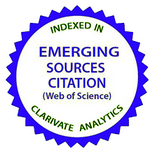SCAPS simulation of ZnO/CdS/CdTe/CuO heterostructure for photovoltaic application
DOI:
https://doi.org/10.15330/pcss.21.4.660-668Keywords:
photovoltaic, solar cells, heterostructure ZnO/CdS/CdTe/Cu, cadmium telluride thin films, SCAPS simulation, CdTe thin filmsAbstract
The authors have developed a simple, cheap and reproducible technology for obtaining thin-film heterostructures based on CdTe with a given surface morphology during vacuum deposition, which contributes to their low cost [1, 2]. The critical dimensions (thicknesses) of individual layers of the heterostructure were substantiated, a simulation was performed and a wide range of optical properties was investigated [3]. It is shown that for the deposited CdS / CdTe heterostructure on glass it is possible to obtain an efficiency of 15.8%.
Given that thin films are relatively new systems, their study can offer much wider opportunities for technological improvement of photovoltaic energy converters. According to the analysis of modern literature data, the efficiency can be increased by performing deposition on ITO films and introducing nanoparticles of controlled sizes.
References
B.K. Ghosh, I. Saad, K.T.K. Teo, and S.K. Ghosh, mcSi and CdTe solar photovoltaic challenges: Pathways to progress, Optik 206, 164278 (2020) (https://doi.org/10.1016/j.ijleo.2020.164278).
G. Wisz, L.I. Nykyruy, V.M. Yakubiv, I.I. Hryhoruk, R.S. Yavorskyi, Impact of advanced research on development of renewable energy policy: case of Ukraine, International Journal of Renewable Energy Research 8(4), 2367-2384 (2018).
R.Y. Petrus, H.A. Ilchuk, A.I. Kashuba, et el., Optical Properties of CdS Thin Films, Journal of Applied Spectroscopy 87(1), 35-40 (2020) (https://doi.org/10.1007/s10812-020-00959-7).
J.M. Kephart, R.M. Geisthardt et el., Optimization of CdTe thin-film solar cell efficiency using a sputtered, oxygenated CdS window layer, Prog. Photovolt: Res. Appl. 23, 1484-92 (2015) (https://doi.org/10.1002/pip.2578).
Web-source: https://www.nrel.gov/pv/cell-efficiency.html.
S. Marjani, S. Khosroabadi, and M. Sabaghi, A High Efficiency Ultrathin CdTe Solar Cell for Nano-Area Applications, Optics & Photonics Journal 6(2), 15-23 (2016) (http://dx.doi.org/10.4236/opj.2016.62003).
S.G. Kumar, K.K. Rao, Physics and chemistry of CdTe/CdS thin film heterojunction photovoltaic devices: fundamental and critical aspects, Energy & Environmental Science 7(1), 45-102 (2014) (https://doi.org/10.1039/C3EE41981A).
E. Colegrove, R. Banai, C. Blissett, C. Buurma, J. Ellsworth, High-Efficiency Polycrystalline CdS/CdTe Solar Cells on Buffered Commercial TCO-Coated Glass, Journal of Electronic Materials 41, 2833–2837 (2012) (https://doi.org/10.1007/s11664-012-2100-z).
A.B. Danylov, H.A. Ilchuk, R.Yu. Petrus, Effect of HRT ZnO Film on Optical Spectra of Transmission in CdS/CdTe Solar Elements, Acta Physica Polonica A 133(4), 981-983 (2018).
M.A. Green, K. Emery, Y. Hishikawa, W. Warta, Solar cell efficiency tables (version 37). Progress in photovoltaics 19(1), 84-92 (2011). (https://doi.org/10.1002/pip.1088).
M.A. Green, E.D. Dunlop, J. Hohl‐Ebinger, M. Yoshita, N. Kopidakis, X. Hao, Solar cell efficiency tables (version 56), Progress in Photovoltaics: Research and Applications 28(7), 629-638 (2020) (https://doi.org/10.1002/pip.3303).
R. Naba, Paudela, Y. F. Yan, Enhancing the photo-currents of CdTe thin-film solar cells in both short long wavelength regions, Applied Physics Letters 105, 183510 (2014) (https://doi.org/10.1063/1.4901532).
F. Anwar, S. Afrin, S.S. Satter, R. Mahbub, S. M. Ulah, Simulation and performance study of nanowire CdS/CdTe solar cell International, Journal of Renewable Energy Research 7(2), 885-893 (2017).
A. Haddout, A. Raidou, M. Fahoume, Influence of the layer parameters on the performance of the CdTe solar cells, Optoelectronics Letters 14, 98-103 (2018) (https://doi.org/10.1007/s11801-018-7229-4).
S.M. Seck, E.N. Ndiaye, M. Fall, S. Charvet, Study of Efficiencies CdTe/CdS Photovoltaic Solar Cell According to Electrical Properties by Scaps Simulation, Natural Resources 11(4), 147-155 (2020) (https://doi.org/10.4236/nr.2020.114009).
O. Shoewu, G. Anuforonini, O. Duduyemi, Simulation of the Performance of CdTe/CdS/ZnO Multi-Junction Thin Film Solar Cell, Review of Information Engineering & Applications 3(1), 1-10 (2016) (https://doi.org/10.18488/journal.79/2016.3.1/79.1.1.10).
R. Yavorskyi, et el., Structural and optical properties of cadmium telluride obtained by physical vapor deposition technique, Applied Nanoscience 9(5), 715-724 (2019) (https://doi.org/10.1007/s13204-018-0872-z).
R. Yavorskyi, Features of optical properties of high stable CdTe photovoltaic absorber layer, Physics and Chemistry of Solid State 21(2), 243-253 (2020) (https://doi.org/10.15330/pcss.21.2.243-253).
L.I. Nykyruy, R.S. Yavorskyi, Z.R. Zapukhlyak, G. Wisz, and P. Potera, Evaluation of CdS/CdTe thin film solar cells: SCAPS thickness simulation and analysis of optical properties, Optical Materials 92, 319-329 (2019) (https://doi.org/10.1016/j.optmat.2019.04.029).
L. Nykyrui, Y. Saliy, R. Yavorskyi, Y. Yavorskyi, V. Schenderovsky, G. Wisz, & S. Górny, CdTe vapor phase condensates on (100) Si and glass for solar cells. In 2017 IEEE 7th International Conference Nanomaterials: Application & Properties (NAP) 01PCSI26-1, IEEE (2017) (https://doi.org/10.1109/NAP.2017.8190161).
A. Morales-Acevedo, N. Hernández-Como, G. Casados-Cruz, Modeling solar cells: a method for improving their efficiency, Mater. Sci. Eng. B 177(16), 1430–1435 (2012) (https://doi.org/10.1016/j.mseb.2012.01.010).
D. Wang, H. Cui, G. Su, A modeling method to enhance the conversion efficiency by optimizing light trapping structure in thin-film solar cells, Sol. Energy 120, 505–513 (2015) (https://doi.org/10.1016/j.solener.2015.07.051).
M. Burgelman, J. Verschraegen, S. Degrave, P. Nollet, Modeling thin‐film PV devices, Prog. Photovoltaics Res. Appl. 12(2‐3), 143–153, (2004) (https://doi.org/10.1002/pip.524).
M. Burgelman, P. Nollet, S. Degrave, Modelling polycrystalline semiconductor solar cells, Thin Solid Films 361, 527–532 (2000) (https://doi.org/10.1016/S0040-6090(99)00825-1).
M. Burgelman, J. Marlein, Analysis of graded band gap solar cells with SCAPS, Proc. Of the 23rd Eur. Photovolt. Sol. Energy Conf., Valencia, 2151–2155 (2008) (https://doi.org/1854/LU-678258).
J. Verschraegen, M. Burgelman, Numerical modeling of intra-band tunneling for heterojunction solar cells in SCAPS, Thin Solid Films 515(15), 6276–6279 (2007) (https://doi.org/10.1016/j.tsf.2006.12.049).
S. Degrave, M. Burgelman, P. Nollet, Modelling of polycrystalline thin film solar cells: new features in SCAPS version 2.3, Proc. Of 3rd World Conf. on Photovolt. Energy Convers, vol 1, 487–490 (2003) (ISBN:4-9901816-0-3).
M. Gloeckler, A.L. Fahrenbruch, J.R. Sites, Numerical modeling of CIGS and CdTe solar cells: setting the baseline, Proc. Of 3rd World Conf. on Photovolt. Energy Convers, vol 1, 491–494 (2003).
G. Heal, Reflections – the Economics of Renewable Energy in the United States, Review of Environmental Economics and Policy. Oxford University Press for Association of Environmental and Resource Economists 4(1), 139-154 (2010). (https://www.nber.org/papers/w15081.pdf).
M. Gloeckler, A. L. Fahrenbruch, J. R. Sites, Numerical modeling of CIGS and CdTe solar cells: setting the baseline. Proc. of 3rd World Conf. on Photovolt. Energy Convers., 1, 491-494 (2003).
H. Zerfaoui, D. Dib, M. Rahmani, K. Benyelloul, C. Mebarkia, Study by simulation of the SnO2 and ZnO anti-reflection layers in n-SiC/p-SiC solar cells. In AIP Conf. Proc., 1758(1), 030029 (2016) (https://doi.org/10.1063/1.4959425).
C. Dumitrache, N. Olariu, E. St. Lakatos, G. Mantescu, L. Olteanu, M. Badea, Some New Features of SCAPS 2902 Used for Optimisation of CdS-CdTe Thin-Film Photovoltaic Cell Structure, Electrotehnica Electronica Automatica 61(1), 25 (2013).
S. Khosroabadi, S. H. Keshmiri, Design of a high efficiency ultrathin CdS/CdTe solar cell using back surface field and backside distributed Bragg reflector, Opt. Expr. 22(103), A921-A929 (2014) (https://doi.org/10.1364/OE.22.00A921).
N. Amin, K. Sopian, M. Konagai, Numerical modeling of CdS/CdTe and CdS/CdTe/ZnTe solar cells as a function of CdTe thickness, Sol. Energy Mater. and Sol. Cells 91(13), 1202–1208 (2007) (https://doi.org/10.1016/j.solmat.2007.04.006).
P. Sawicka-Chudy, Z. Starowicz, G. Wisz, R. Yavorskyi, Z. Zapukhlyak, M. Bester, M. Sibiński, M. Cholewa, Simulation of TiO2/CuO solar cells with SCAPS-1D software, Materials Research Express 6(8), 085918 (2019) (https://doi.org/10.1088/2053-1591/ab22aa).
G.A. Il'chuk, V.V. Kusnezh, V.Y. Rud', et el., Photosensitivity of n-CdS/p-CdTe heterojunctions obtained by chemical surface deposition of CdS, Semiconductors 44(3), 318–320 (2010) (https://doi.org/10.1134/S1063782610030085).
P. D. DeMoulin, M. S. Lundstrom, Projections of GaAs solar-cell performance limits based on two-dimensional numerical simulation, IEEE Trans. Electron. Dev., 36, 897–905 (1989) (https://doi.org/10.1109/16.299671).
J. Türck, H. J. Nonnenmacher, P. M. Connor, S. Siol, B. Siepchen, J. P. Heimfarth, A. Klein, W. Jaegermann, Copper (I) Oxide (Cu2O) based back contact for p-i-n CdTe solar cells, Prog. Photovoltaics Res. Appl. 24, 1229–1236 (2016) (https://doi.org/10.1002/pip.2782).
G. Wisz, P. Sawicka-Chudy, P. Potera, M. Sibiński, R. Yavorskyi, Ł. Głowa, B. Cieniek, M. Cholewa, Morphology, composition, structure and optical properties of thermal annealed Cu2O thin films prepared by reactive DC sputtering method, Molecular Crystals and Liquid Crystals 672(1), 81-91 (2018) (https://doi.org/10.1080/15421406.2018.1542110).
P. Sawicka-Chudy, M. Sibiński, E. Rybak-Wilusz, M. Cholewa, G. Wisz, R. Yavorskyi, Review of the development of copper oxides with titanium dioxide thin-film solar cells, AIP Advances 10(1), 010701 – 010701-15 (2020) (https://doi.org/10.1063/1.5125433).
W. Zhang, Y. Li, S. Zhu, F. Wang, Influence of argon flow rate on TiO2 photocatalyst film deposited by dc reactive magnetron sputtering, Surf. Coat. Technol. 182(2-3), 192-198 (2004) (https://doi.org/10.1016/j.surfcoat.2003.08.050).









